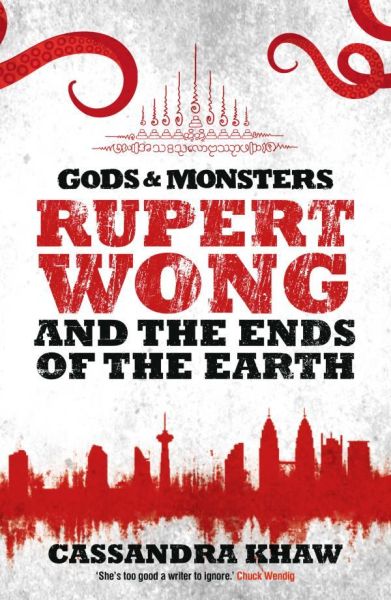All The People
Rupert Wong and the Ends of the Earth (Gods and Monsters, volume 2)
By Cassandra Khaw

5 Apr, 2024
2017’s Rupert Wong and the Ends of the Earth is the second volume in Cassandra Khaw’s Gods and Monsters Trilogy.
Cannibal chef1 Rupert Wong may make his living doing appalling things in service to reprehensible monsters, but at least he has some excuse: massive debts. He also has distractions: mounting trans-pantheon theological and legal problems.
Luckily for Rupert, he is of more value to the Chinese gods as a witness testifying against Dragon King Ao Qin than as a suspect for transgressions of which Rupert is most definitely guilty. Thus, his involuntary trip to Chinese Hell is a visit, not permanent residence. Nevertheless, Rupert is painfully aware that it may only be a matter of time before the authorities take a closer, and for Rupert, more painful, look at his activities.
Fortuitously, Rupert is seconded as chef to a pantheon far from his native Kuala Lumpur. Less fortuitously, he is seconded to the Greek gods. The Greek gods have as much or perhaps even more reason as the Chinese gods to be displeased with Rupert. Regardless, it is an offer Rupert cannot refuse.
Now London-based, the Greek gods are a boisterous and unsympathetic lot. Pestered by upstart rival gods, the Greek gods care about their murdered servants only to the extent that they can exploit the murders to their own benefit. Rupert’s survival is dependent not any regard the gods have for their employees, but on his immediate utility. This utility may expire the moment the Greek gods remember that they are annoyed at Rupert.
Can Rupert escape the trap into which his decisions have led him? Or will his next cunning plan create complications somehow even worse than mountainous debts and having three pantheons — Chinese, Greek, and upstart — gunning for him?
~oOo~
Readers averse to murder, body horror, and gallows humour might want to avoid this novel.
Rupert is a cynical2 smart-mouthed chatterbox, with a knack for rattling on a few sentences too long. He’s not always a sympathetic character. Readers should remember that he did in volume one what he did3 for true love.
Khaw sets up a world in which gods are a by-product of and dependent on human faith. (This reminded me of Pratchett.) The gods are endoparasites4. Consequently, while atheism in the sense of denying gods exist would be silly — you can literally poke gods with a stick! — you might well conclude that gods do exist, but do not deserve the worship they demand.
Rupert eventually manages to resolve his difficulties. It’s not a novel solution. Other SFF works have used it to get their protagonists out of seemingly inescapable dilemmas. I could list those but … I’m not going to spoil the book for you. I will say that Rupert survives; this isn’t just a grim novel about a bug desperately running around until he is squashed.
Rupert Wong and the Ends of the Earth is available here (Amazon US), here (Amazon Canada), here (Amazon UK), here (Apple Books), here (Barnes & Noble), here (Kobo)
I did not find it Rupert Wong and the Ends of the Earth at either Chapters-Indigo or Words Worth Books.
1: Rupert is a chef for cannibals, not a chef who is a cannibal.
2: Rupert is completely cynical. He’s gullible enough to accept (without doublechecking) an extreme claim from a being who very much needs Rupert on his side. Granted, the claim seems plausible.
3: Some of the nasty things that Rupert did were done to survive. One of the Greek gods chides him for cowardice. It should be noted, however, the god is nigh invulnerable himself.
4: The Chinese gods seem more invested than the Greeks in looking out for their worshippers. The Chinese gods are prudent only in comparison to the Greek gods, who are real jerks.
